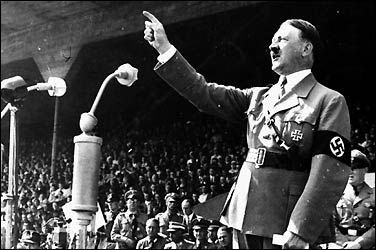HEINRICH WAGNER
------------
"It is the combination of Aryan racial energy and American efficiency that is the foundation of our Reich. Without a proper veneration for race and blood, American efficiency will invariably degenerate into decadence and stagnation. Without the efficiency that is the Americans' one great achievement, the creativity of the Aryan will not have sufficient means to actualize itself, and will in the coming trial be found wanting."
"There is no shame in learning from one’s enemies. In any competition, one is sometimes the teacher, at other times the student. In the latter case, the lessons must be learned well, and applied."
"The defeat of Germany in the First Great War was the result of many factors. The machinations of the Jew were undoubtedly the most important, and the one without which the others would never have mattered, but they all weaken the Volk, and they must all be excised, like a tumor, or an infected limb."
"The eradication of Judeo-Bolshevism is our unwavering aim. Bolshevism is but the latest manifestation of the parasitic influence of Jewry everywhere it establishes itself, and in the New Order both as such will be erased. However, it should not be taken from this that no Jews can be made useful to our Reich. One would not refuse to live in a house, or drive a car, which had been owned by them, and neither should one refuse to make use of a Jew, when he no longer owns himself."
"It makes no difference to a workhorse what it bears, only how heavy the burden is. For Russia, the transition from Bolshevism to National Socialism will mean nothing more than a change of masters. The Russians have been slaves throughout the entirety of their existence. They were slaves to the Mongols. They were slaves to the Czars. Now they are slaves to the Jews and their lackeys. In the future they will be slaves to us."
-Robert Heinrich Wagner, Chancellor of Germany and Chairman of the National Socialist People’s Party (NSVP), as quoted in Wagner’s Table Talk
-----------------------
Index
Prologue
Part I
Night of the Hangmen
Hjalmar Schacht and the First Four-Year Plan
The Rising Storm
Turning Point
Part II
The Volkswehr: Leadership and Doctrine (Appendix)
Weapons of the Volkswehr (Section 2)
The Axis Alliance and the Nuremberg Agreement
The Molotov-Neurath Accords and the Danzig Crisis
The Cold Peace and the American Election
The Alsace Crisis and the Coming of War
Part III
Blood on the Ice (Section 2)
Plans and Preparations
The Battle of the Bulge
Cut of the Scythe
The Fate of France
Part IV
A Sleeping Giant Stirs
The Axis Alliance Grows
The Battle of the Mediterranean
Tracks in the Desert
Thrust and Riposte
Wolves and their Quarry (Appendix)
The Prince of Foxes
Through the Eyes of the World
The Pact of Blood and the Autumn War
The Rim of Fire
The Treaty of Tehran
Part V
A New Order Coalesces
Dilemma and Decision
In the Light of the Rising Sun
A Double-edged Sword (Section 2)
A Crown Jewel Fractures
When the World Held its Breath (Appendix)
The Border Battles (Section 2)
------------------------
Prologue
Part I
Night of the Hangmen
Hjalmar Schacht and the First Four-Year Plan
The Rising Storm
Turning Point
Part II
The Volkswehr: Leadership and Doctrine (Appendix)
Weapons of the Volkswehr (Section 2)
The Axis Alliance and the Nuremberg Agreement
The Molotov-Neurath Accords and the Danzig Crisis
The Cold Peace and the American Election
The Alsace Crisis and the Coming of War
Part III
Blood on the Ice (Section 2)
Plans and Preparations
The Battle of the Bulge
Cut of the Scythe
The Fate of France
Part IV
A Sleeping Giant Stirs
The Axis Alliance Grows
The Battle of the Mediterranean
Tracks in the Desert
Thrust and Riposte
Wolves and their Quarry (Appendix)
The Prince of Foxes
Through the Eyes of the World
The Pact of Blood and the Autumn War
The Rim of Fire
The Treaty of Tehran
Part V
A New Order Coalesces
Dilemma and Decision
In the Light of the Rising Sun
A Double-edged Sword (Section 2)
A Crown Jewel Fractures
When the World Held its Breath (Appendix)
The Border Battles (Section 2)
------------------------
Note: No, this is not a Weber's Germany rip-off. It will have similarities, especially in the beginning, but will go in its own direction, being far more wankish, as I mentioned earlier. An outline of the historical Wagner can be found here.
Further note: For the sake of clarity, my position with regard to this timeline is that it is plausible and reasonably realistic.
Last edited:


